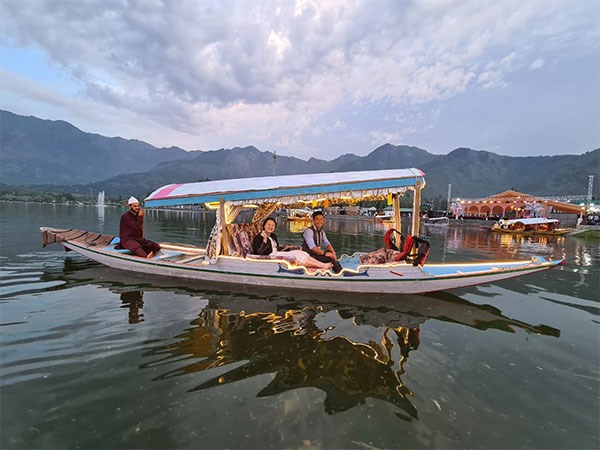

G20 delegates enjoy a Shikara boat ride in Srinagar (Photo: ANI)
G20 delegates from across the world enjoyed a day of sight-seeing – visiting bazaars and soaking in the natural beauty of Jammu and Kashmir (J&K). The international media also showcased the beauty of the north Indian state as well as the stability in the region which had earlier witnessed bloodshed by Pakistan-trained militants from across the border.
After taking over the presidency of the G20 last year from Indonesia, New Delhi planned events across the country in a bid to showcase the diversity and potential of the country. The three-day G20 Tourism Working Group (TWG) meeting, held in Srinagar from May 22-24, was an effort in that direction.
In Srinagar, tourism delegates from across the world were wooed by Kashmir’s women entrepreneurs who displayed their handicrafts. The delegates were mesmerised by shikara rides on the Dal Lake nestled among the picturesque mountains and were witness to traditional dances and the rich local heritage.
Kashmiri youth took the lead in welcoming the delegates by putting up performances of the local arts. The young people in J&K have been taking up sports, cultural activities and imbibing the spirit of entrepreneurship after the state was freed from the shackles of the highly parochial Article 370 in August 2019.
For more than a thousand years before the advent of Islam, Kashmir was the seat of Shaivism, Vaishnavism and Buddhism. Capital Srinagar gets its name from ‘Shri Nagara’, meaning ‘auspicious city’ and is linked to Lakshmi, the Goddess of Fortune, says writer Devdutt Pattanaik.
The partition of India on communal lines, and the Islamist cross-border terrorism promoted by Pakistan, derailed the development of J&K besides poisoning the social fabric of the region. Alarming rise in militancy along with the influx of sophisticated weapons also led to the ethnic cleansing of non-Muslim minorities like Hindus and Sikhs, who were forced to leave their homeland.
For almost the past one year, a politically unstable and economically-deprived Pakistan has led a strident global campaign asking countries not to attend the G20 events in India. Pakistan followed up its campaign with threats and by pumping in heavily-armed men in J&K to attack Indian soldiers, kill Hindu civilians and threaten international delegates from attending the G20 events.
Eventually, the G20 tourism meeting was boycotted by the two all-weather allies Pakistan and China, both of whom have attacked the Indian region through terror activities and military aggression.
Also read: Pakistan’s social media campaign against G20 Kashmir meetings fizzles out
Family members of leading Baloch activist and Baloch Yakjehti Committee (BYC) leader, Sammi Deen Baloch…
Chile President Gabriel Boric, who is on a State visit to India, has expressed keen…
The French Embassy in India said on Monday that as France assumes the monthly presidency…
BNP-M President Sardar Akhtar Mengal said on Monday that his party's sit-in demanding the release…
Prime Minister Narendra Modi on Tuesday jointly addressed the press with Chile President Gabriel Boric…
INSV Tarini, part of the Navika Sagar Parikrama II expedition, arrived in Cape Town, South…